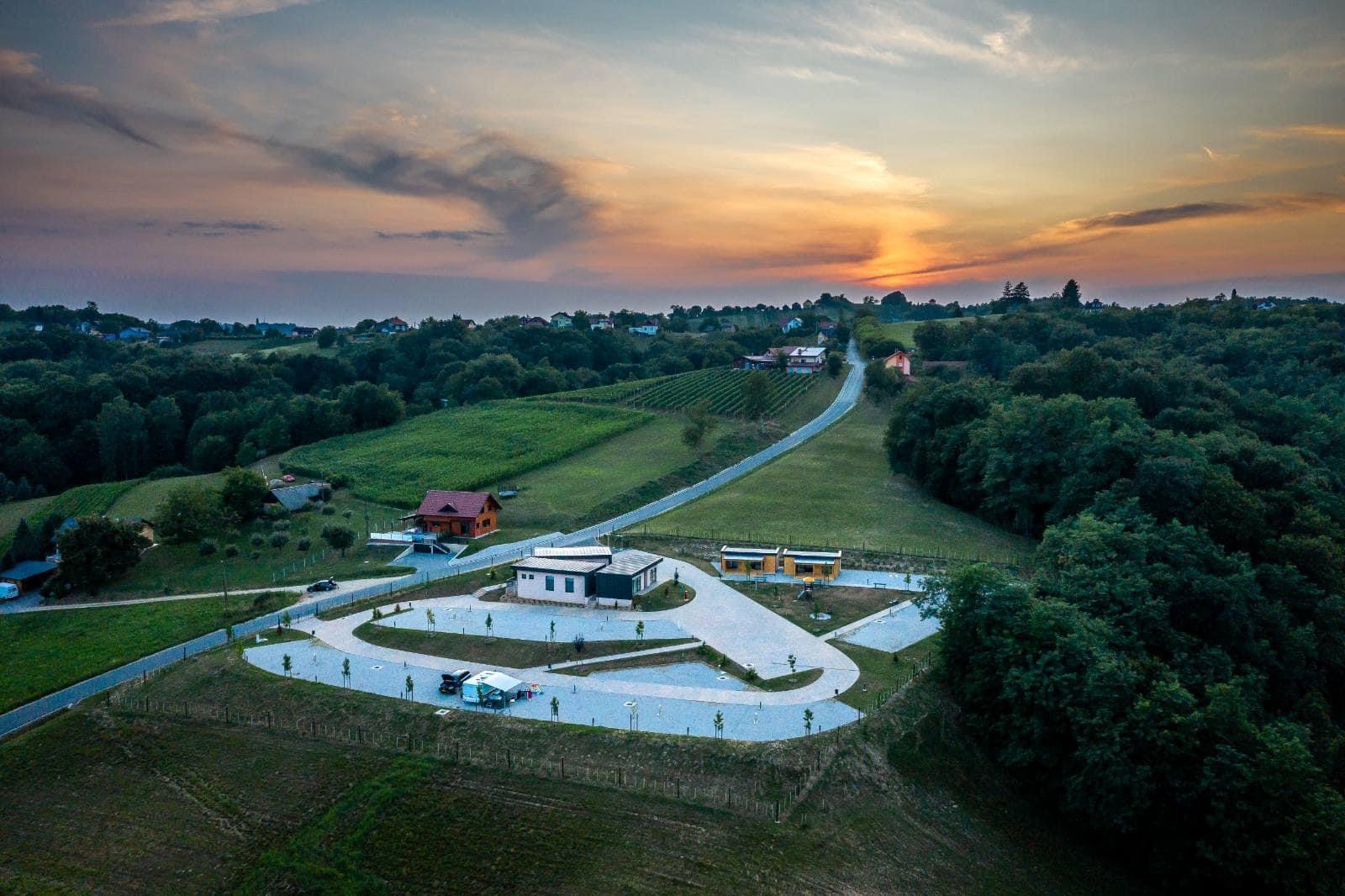Hažić Wine Camp, First of Its Kind in Croatia, Among Best Small Camps
October 5, 2021 - When it comes to Croatian tourism, wine and camps are always part of the conversation in almost all regions of the country. In Međimurje, a family has combined both concepts, and it is thus that the Hažić Wine Camp has recently been recognized for its wine and accommodation offer.
This year, the Hažić family opened the first wine camp in Croatia, located in Međimurje, more precisely in Sveti Martin na Muri. As Turističke Priče reports, the aforementioned wine camp received the OK Mini Camps quality award and was thus included among one of the best small camps in Croatia.
''We are pleased to announce that based on the analysis of the quality of the content and service of our camp by the KUH commission, we are included in the list of 46 best small camps in Croatia'', said the Hažić Wine Camp.
This wine camp is the first camp of its kind in Croatia. It is located in the untouched nature of upper Međimurje, on the famous tourist route in the immediate vicinity of Terme Sveti Martin and the Mill House by the river Mura.
Photo: Hažić Wine Camp Official Facebook Page
The camp on the family farm Hažić offers 12 pitches for campers and eight wooden mobile homes, electricity, water, wi-fi, toilets, children's playground, grill area, laundry service, and pets are allowed. Otherwise, the entire Hažić Wine Camp was built according to the highest environmental standards with the category of four suns.
The camping pitches range in size from 80 to 110 square meters and bear the names of the most represented grape varieties in the Međimurje vineyards, which is another great example of connecting with a local and authentic story.
Međimurje got its first Wine Camp thanks to the Hažić family, which has been recognized for more than 30 years for quality local products such as wine, apples, and honey, and to their Hažić Family Farm and Wine House, they have now added the third in a series of investments, but certainly not the last.
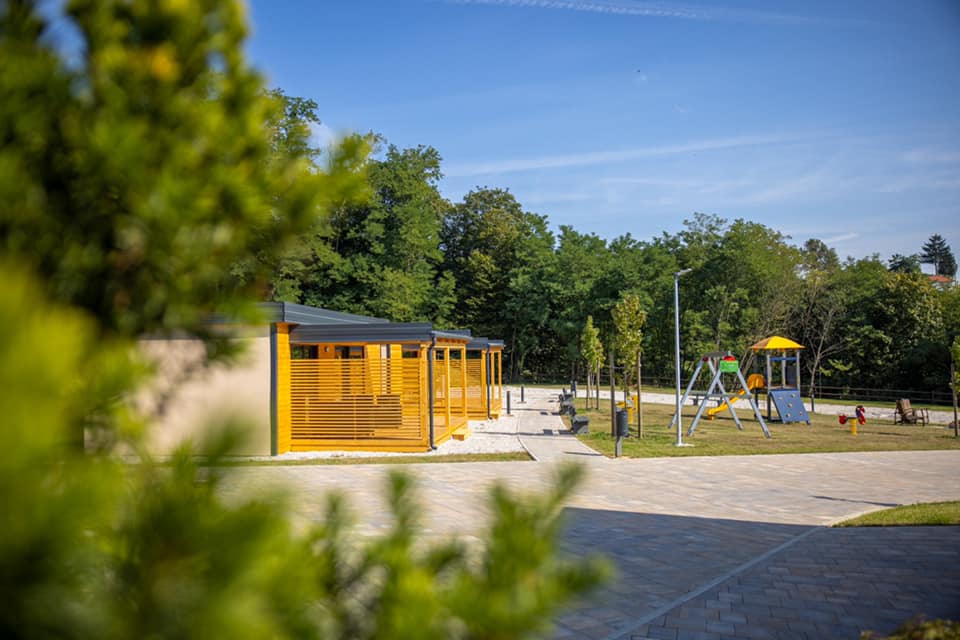
Photo: Hažić Wine Camp Official Facebook Page
Apart from quality products, the Hažić, Biserka, and Radenko family, with their daughters Tatjana and Valentina, who continued the family farm, is also known for innovative ideas aimed at tourism and the agriculture sector, which is confirmed by this investment.
Međimurje is a top wine region
Međimurje is a top wine region, and proof of that are the numerous medals from last year's, but also this year's Decanter World Wine Awards, where it was confirmed that the best Croatian sparkling wines come from Međimurje. And this is no coincidence, since in 2016, for the first time in history, the first two medals arrived in Međimurje.
The camp offers accommodation to tourists who want to enjoy nature, fine wines, sparkling wines, juices, and other products from the workshop of the Hažić family.
Campers in the area can enjoy cycling, wellness services of Terme Sveti Martin, getting to know local cultural sights, enjoying numerous adventurous activities organized by the Accredo Center or a picnic with excellent local food and drinks of the restaurant Međimurski dvori, and at the request of the guest will offer delivery breakfast in the form of a pinklec basket on the plot. Guests and tourists of the camp can also enjoy local products from Međimurski štancun.
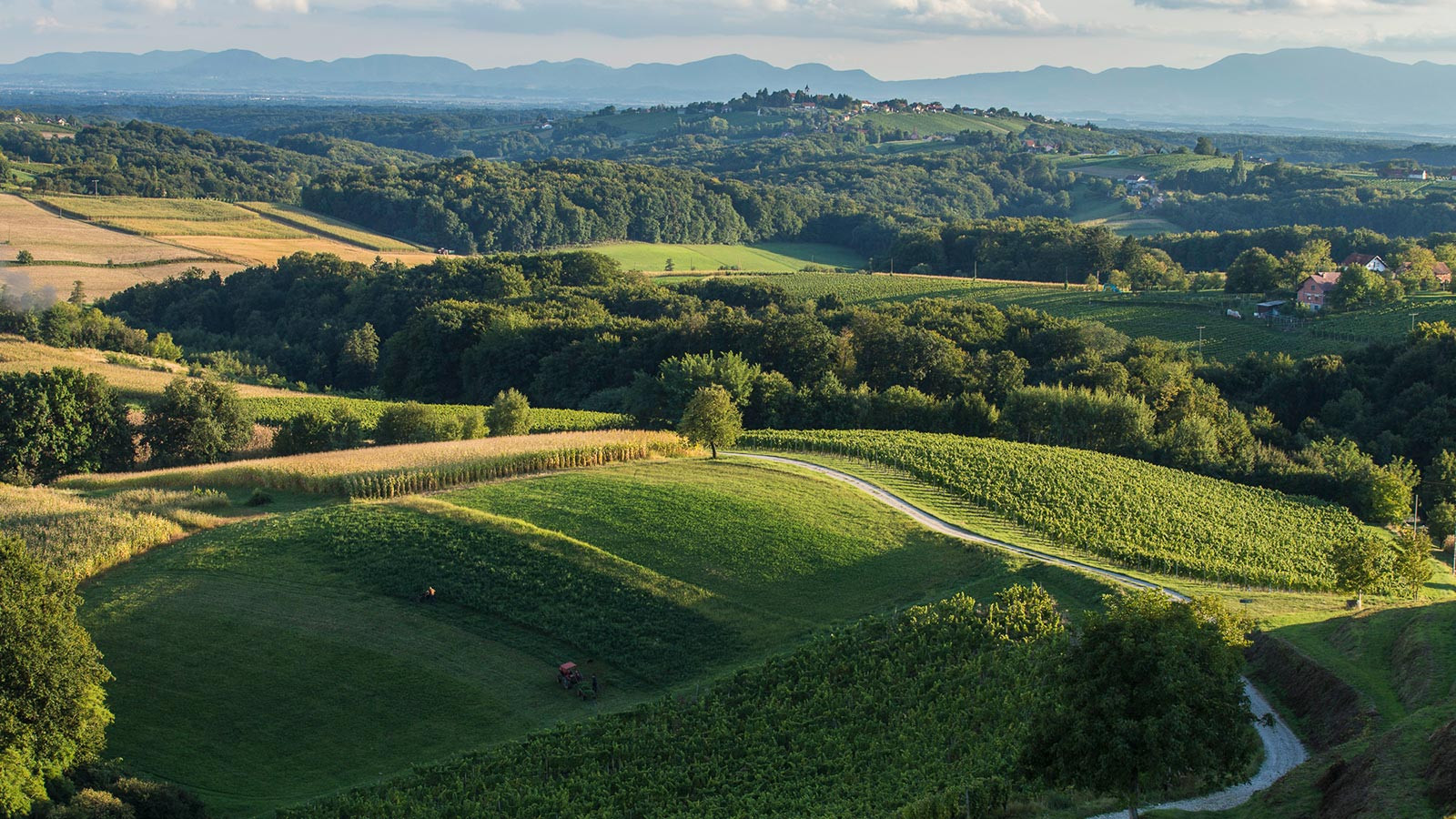
Photo: Croatia.hr
Located in the fertile lowlands between the rivers Mura and Drava, Međimurje justifies its nickname – the Garden of Croatia. The neat little villages and towns intertwine with an enchanting landscape. The region might be small, but it offers a bounty of attractions to impress any visitor. Whether you are into food and wine, relaxation and outdoor activities, or exploring local history, Međimurje is a garden full of possibilities. If you want to learn more about the ''Garden of Croatia'', be sure to read Total Croatia's Međimurje in a Page HERE.
Croatian wines and grapes are among the best in the world, and you can find more information about them in Total Croatia’s Guide to Croatian Wine HERE.
For more, make sure to check out our dedicated travel section.
Jelsa Wine Festival Returns After Last Year's Break
August 26, 2021 - After a year-long hiatus from the pandemic, one of the most popular and traditional events in the town of Jelsa on the island of Hvar marks its long-awaited return. The Jelsa wine festival starts tomorrow and includes sports, cultural activities, a great gastronomic offer, and of course, the best from its wineries.
As written by Turističke Priče, the first Jelsa wine festival was held back in 1952 on the initiative of the community of the Cooperative Association of Jelsa called the District Cooperative Meeting. In 1954, Cooperative Day was held, and since 1956, this event has been called the Wine Fair or Cooperative Rally. The Wine Fair in 1966 was held on August 14 and that day was declared the Day of Tourism in Jelsa. The festival has been held for years in the first half of August, from Friday to Sunday. The crowd would start in the morning and last until dawn the next day. Huge quantities of wine were poured because the idea was to free the taverns by selling old wine for the new one that will come with the upcoming harvest.
This year's Wine Festival is held on August 27 and 28 and in recent years this event has returned to its original purpose: to be a cheerful event to promote Hvar wines, especially the best in the Jelsa ring, a wine-growing region where we find many original varieties of islands such as Bogdanusa, prča, plavac mali, but also the popular international cabernet sauvignon, merlot, and syrah, and thus various wines, from white and red, rosé, to the popular opol and prosecco.
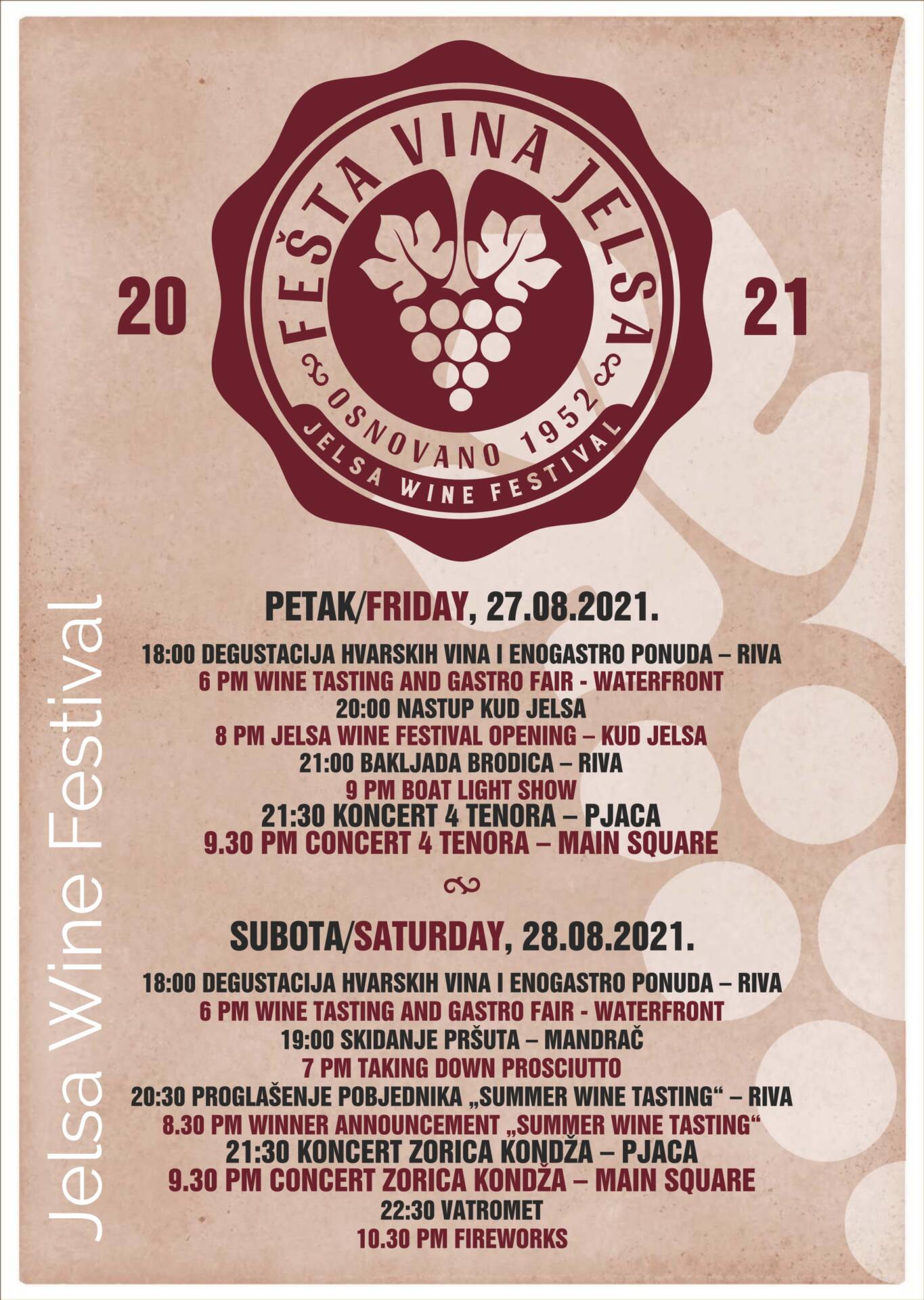
Jelsa Wine Festival
For the last thirty years, these wines have stood out for their quality, won prizes in competitions, and delighted guests for whom the Wine Festival is a real opportunity to taste and feel the differences between wines from the southern slopes of the island, positions from Jelsa slopes and valleys and fields by the sea. The wine festival is an experience that tourists remember - the sun and the sea have long been the only assets of the island, but also tradition, wine, gastronomy, Dalmatian songs... the spirit of the Mediterranean as it once was.
Various sports and entertainment competitions have been announced: water polo matches are played in the port, rowing competitions are held, international regattas as well, and prosciutto is removed from the top of a ten-meter-high mast. Everything is, of course, spiced with a gastronomic offer and accompanied by concerts. This year, Four Tenors and Zorica Kondža are in charge of good music.
For the third year in a row, in cooperation with the Hvar Winemakers Association and the Wine Stars project, a Summer Wine tasting by Wine Stars is held as part of the Jelsa Wine Festival, with an emphasis on original varieties and what makes them different from other wine regions. Book the last weekend in August for Jelsa where the hosts invite you and guarantee good fun. This year's program will be conducted in accordance with current epidemiological measures and the entire program can be found at this LINK.
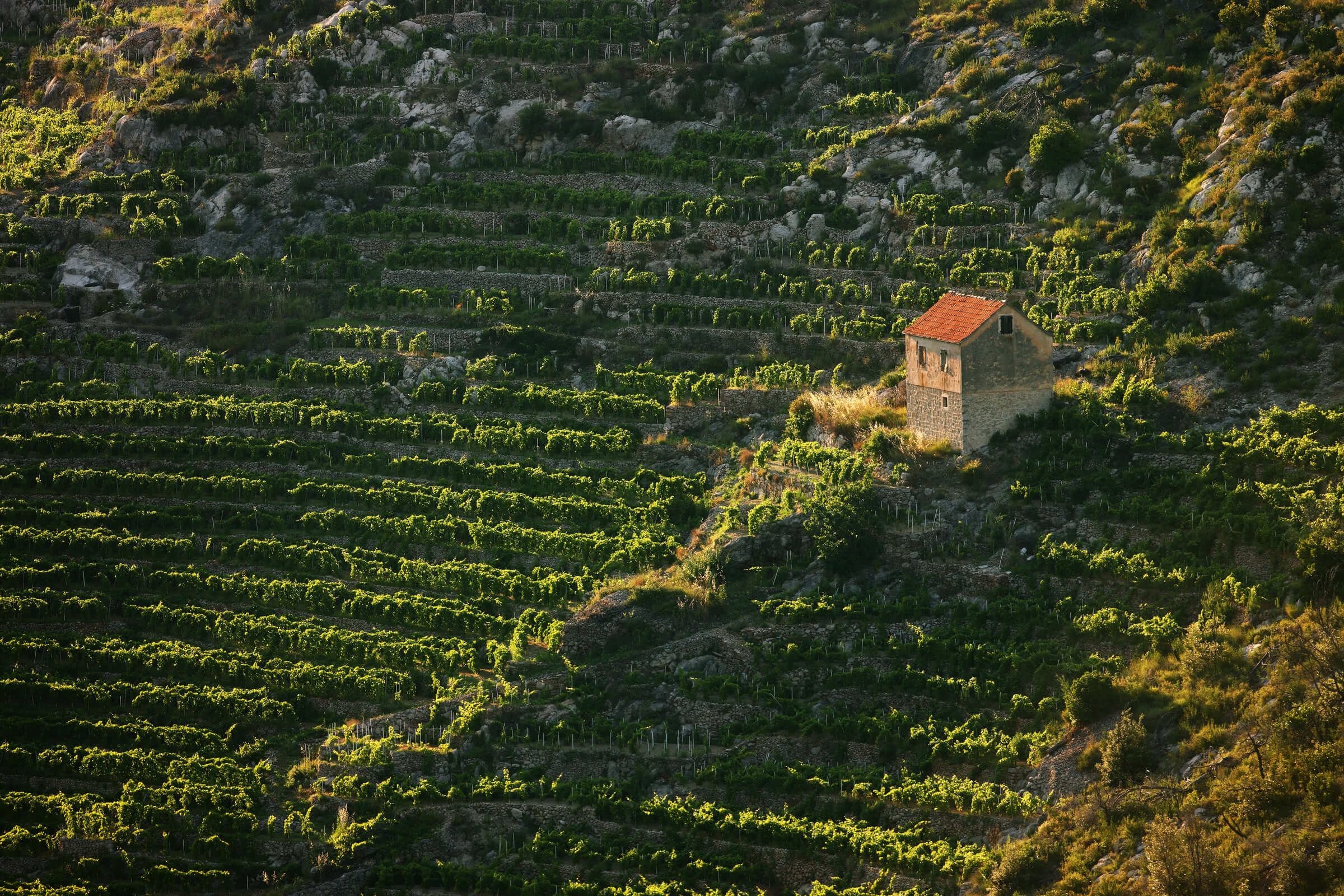
Vineyard on the hills of Jelsa (Photo: Mario Romulić)
After the wine festival, when you are in Jelsa, be sure to look up and discover the starry sky. Apart from the sun and the sea and top wines, Jelsa also offers tourists a starry sky, and the stars are disappearing in modern times precisely because of light pollution, and observing the starry sky is becoming a tourist attraction that you cannot often see.
The stars will be the brightest tourist product of Jelsa, which should acquire the status of the International Dark-Sky Community by the end of the year and become the first municipality/city in Croatia to proudly bear that title. This title confirms Jelsa as a destination that has an exceptional quality of the night sky and respects high environmental standards in terms of light pollution, which together make a big step towards creating an astro-tourist offer in the area of Jelsa.
Croatian wines and grapes are among the best in the world, and you can find more information about them in Total Croatia’s Guide to Croatian Wine HERE. Now in your language!
Jelsa is a slice of safe, authentic lifestyle heaven on Croatia’s premier island, with wine and beach treasures galore. Everything you need to know about Jelsa, you'll find it in our Total Croatia's Jelsa on a Page HERE.
Follow the latest travel updates and COVID-19 news from Croatia HERE.
For more on travel in Croatia, follow TCN's dedicated page.
Feravino Winery Has Plan to Change People's Perception of Slavonia
August the 12th, 2021 - Slavonia has unfortunately always been overlooked. With tourism still very much focused on the coast, even Zagreb continues to live in the Adriatic sea's shadow. Eastern Croatia can barely get a look in and Slavonian wine is often referred to as cheap. Could that all finally change with the Feravino winery's Slavonia-oriented projects? Maybe.
As Jozo Vrdoljak/Novac writes, back at the beginning of last year, in cooperation with the consulting company BlueRock Consulting, a strategy was developed for the development and long-term sustainability of Feravino, and consequently Fericanci in Slavonia as a destination.
The new vision of growth and development defined by the strategy undertaken by Feravino has the main goal of transformation into a modern boutique winery. In addition to the vision, the need for serious rebranding and new positioning was recognised because, given the complex market and the demands of today's consumer, Feravino faced significant challenges that need to be overcome. As such, Enosophia was created, a new brand that represents a new direction of the development of Feravino based on the long tradition of those vineyards, as well as investment, innovation, boutique production and a focus on quality.
A significant step forward
''The whole story began when we realised that we have to adapt and change in order to be able to alter our own perception on the one hand and the perception of Slavonia and Slavonian winemakers on the other. We saw the problem of the negative perception faced by Slavonian winemakers and the perception of Slavonia as a region where cheap wines are produced.
We decided to take these problems seriously, realising that we needed a strategic approach and a complete solution to tackle this issue. The result is a new development strategy, the development of which we worked on with expertsm'' said Ivan Maricic. With partners from the Bruketa & Zinic & Gray agency, the process of rebranding the Feravino winery has begun. A new brand architecture has been created with a new visual identity, and all the products it will launch in the coming years will also have a new air about them.
''Surrounding ourselves with the best in the industry, we've created a new brand that will be able to carry everything we've done so far and realise all our plans and ambitions. This is how Enosophia, our wisdom of wine, was created,'' explained Ivan Maricic.
The Feravino winery's brand new strategy implies a significant step forward in terms of wine production in the premium category, which ultimately aims to increase the share of sales in the higher price segment, especially the HoReCa channel. The strengthening of their portfolio with high-quality wines has also been confirmed by the first two brands of Enosophia, Grasevina TRS no. 5 and rose Matarouge. These are wines with which the Feravino winery wants to interest a younger audience. This is to be achieved by an innovative interactive label, the first of its kind in the Croatian wine industry. Intensive work is also being done on the development of more new products.
One of the most important projects for the adopted strategy is the development of continental tourism and Fericanci in Osijek-Baranja County as a destination. It is part of the holistic approach of the new winery, which, in addition to the excellence of the product itself, implies care for people, sustainable development and the proper positioning of Slavonia.
''Our idea isn't only to be among the best wineries in Croatia, but also a winery that will make Fericanci a desirable tourist destination and attract young people to return or come to live in Slavonia,'' emphasised Ivan Maricic.
Heritage hotel
The plan is to build a wine hotel with a capacity of 60 to 80 rooms, which will be built on the site of the old cellar.
''We'll set up a restaurant with all of the associated facilities in the vineyards, as well as some additional accommodation. Recently, we've had some horses and a stable built next to the location of the future wine hotel, which will further complete the future tourist offer,'' explained Maricic, adding that the value of these projects stands at over 20 million euros.
''We're also actively working on the construction of a heritage hotel, which will be realised with the restoration of the Mihalovic mansion. The project is worth six million euros and the hotel should be completed in the second half of 2022. It will be one of the more luxurious hotels in Croatia with fewer accommodation units, but with rich accompanying facilities,'' stated Maricic.
Along with tourism projects, the reconstruction and upgrade of the Feravino winery itself is planned, including the construction of a tasting room and showroom, with additional storage capacities. It is also a large investment, worth about five million euros in total.
''Over recent years, we've worked hard on raising new plantations and converting our vineyards. The conversion, which is the replacement of old vineyards with new ones, was done with the help of funds from the Wine Envelope, ie with cash from European Union (EU) funds. Last year, investments were completed in two new cellars, for fermentation and wine aging. One has a capacity of 570,000 litres of stainless steel containers, and the other 147,000 litres of large wooden barrels.
In total, more than five million euros have been invested in these projects in the Feravino winery in the last three years alone. We'd also like to emphasise our investment in new equipment for the production of sparkling wines,'' Maricic concluded.
For more, follow Made in Croatia.
Croatian Wine Moscato di Momiano Gets Protected Designation of Origin Label
August the 10th, 2021 - Croatian wine is well known and respected throughout the world as excellent. The Croatian wine Moscato di Momiano (Muskat Momjanski) is the 18th wine so far to be given the sought after protected designation of origin label.
As Poslovni Dnevnik writes, the Ministry of Agriculture reported that Muskat Momjanski (Moscato di Momiano) has become the 18th Croatian wine to boast a protected designation of origin in the European Union (EU) and that a register of designations of geographical origin of the EU has been entered in eAmbrosio.
On August the 2nd, 2021, the European Commission (EC) announced in the Official Gazette of the EU that the Croatian wine Moscato di Momiano had received the European protected designation of origin, which entered this product in eAmbrosio's register of geographical indications of EU origin, according to a statement from the Ministry.
The procedure for the protection of the name Moscato di Momiano/Muskat Momjanski began after the Republic of Croatia's official and full accession to the EU back in July 2013, when a request was submitted for the protection of the designation of origin for the Croatian wine Moscato di Momiano/Muskat Momjanski.
The request for protection was submitted to the Ministry of Agriculture by the "Vino Momilianum" Association, and the specification for the aforementioned product was prepared by the Institute of Agriculture and Tourism from Porec, as well as by the members of the above-mentioned Association.
The name combines the name of a grape variety (Muscat/Moscato, from the Muscat white variety) and the name of the geographical area (Momjanski/di Momiano) after Momjan, which is located in the northern part of the beautiful Istrian peninsula, famous for its popular wines.
Although the Muscat white wine is traditionally grown to a greater or lesser extent in various parts of Istria, Momjan has long been known as a typical area for growing this particular type of wine.
For more, follow Made in Croatia.
Croatian Winemakers Won 254 Medals at the Decanter World Wine
July 10, 2021 - Croatian winemakers continue to win, receiving 254 medals at the 18th edition of the prestigious Decanter World Wine Awards, 28 more than last year.
The long-awaited results of the 18th edition of the Decanter World Wine Awards 2021 have been announced, Turističke priče reports. The world’s largest wine competition has had the biggest challenge to date, with a record 18,094 wines from 56 countries applying. For 15 consecutive days in June, nearly 170 wine judges, including 44 wine masters and 11 sommelier masters, declared the 50 best wines and 179 platinum, 635 gold, 5,607 silver, and 8,332 bronze medals.
Croatian winemakers won 254 medals at the Decanter World Wine Awards, 28 more than last year. Three Croatian wineries won the platinum medal and a total of 97 points - Benvenuti (Motova), Zure (Korčula), and Bire (Korčula). In total, Croatian winemakers won 3 platinum awards, 8 gold, as many as 80 wines were decorated with silver, and 163 bronze.
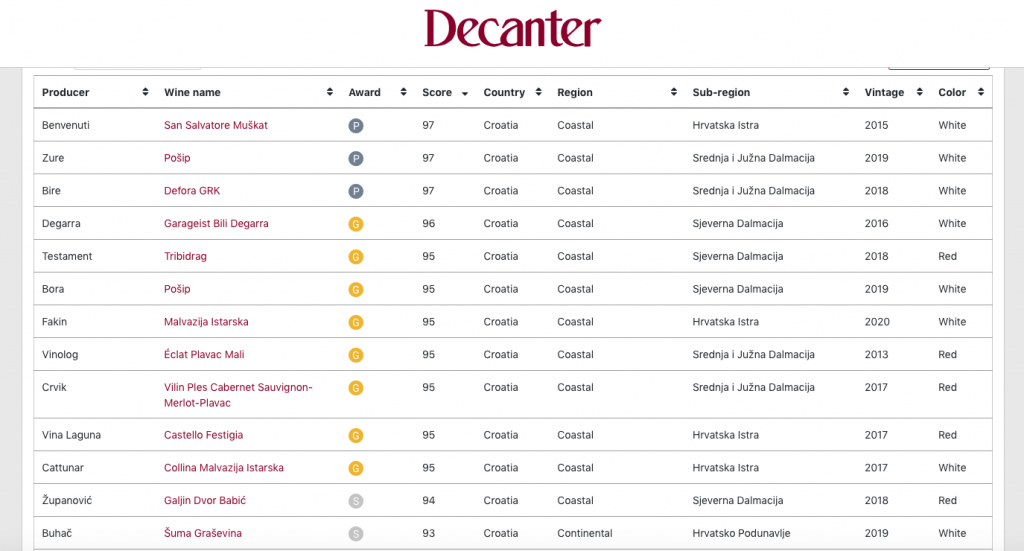
(Screenshot)
Unfortunately, this year we did not achieve positioning at the very top of Decanter's list with at least one wine in the category Best in Show or top 50 best wines in the world, but as more and more Croatian winemakers invest more and more in quality, we are sure that we will get to that last step.
Let's list the gold medals for eight wines: the coast was dominant, so five medals went to Dalmatia, and three to Istria.
Degarra Garageist Bili 2016.
Bora Posip 2019
Testament Tribidrag 2018.
Fakin Malvasia Istria 2020
Cattunar Collina Malvasia Istria 2017
Crvik Vilin Dance Cabernet Sauvignon-Merlot-Plavac 2017
Vinologist Eclat Plavac Mali 2013
Vina Laguna Castello 2017. - Festigia
You can see the full list of winners here.
Last year, Croatian wines won three platinum, 11 gold, 68 silver, 88 bronze awards, and 56 awards. At this year's Decanter, Spain dominated and more than doubled the medals compared to the year before when France was the main one. Nine of the 50 Best in Shows were awarded to Spanish wines, and out of the nine outstanding, as many as three offer exceptional quality for less than around 15 euros per bottle. It is important to mention Germany, which achieved record results, and especially worth mentioning Spätburgunder Pinot Noir and world-class chardonnay.
Croatian wines and grapes are among the best in the world, and you can find more information about them in Total Croatia’s Guide to Croatian Wine HERE. Now in your language!
For more made in Croatia news, follow TCN's dedicated page.
Enosophia: First Wine with Interactive AR Label on Croatian Market
July the 5th, 2021 - Enosophia is the first wine available here on the Croatian market with an interactive AR label and an aim to properly position Slavonia among the top wine regions.
As Poslovni Dnevnik writes, Enosophia is the new face of the Croatian wine scene, a new brand from the Slavonian winery Feravino, which was presented to the public in the Zagreb restaurant La Grma. Enosophia, which in Greek means the wisdom of wine (from the words enos = wine and sophia = wisdom) is said to have originated as a result of development based on a long tradition, investment and ambition to create a quality wine story.
That is showcased by the fact that Enosophia, although a novelty here on the Croatian wine market, was developed as part of the natural process of growth and development of the Feravino brand.
"Through the new brand, we want to provide our consumers with added value, not only through raising the quality of our products but also through taking a holistic approach to the brand. It implies care for people, ecology and sustainable development as well as positioning Slavonia as a desirable wine tourism destination,'' they stated at the promotion of Enosophia.
“We're extremely happy to present Enosophia as a result of our winery's new development strategy and long-term sustainability. It includes significant investments in the development of the winery, the main goal of which is the development of Slavonia to be among the best wine destinations in Croatia. By caring for the sustainable development of the Fericanj area, we want to work on the return of young people to whom we can provide secure jobs and development prospects. We want to do this through and with our new brand Enosophia, which was developed by a team of dedicated and motivated people guided by a common vision,'' said Ivan Ergovic on behalf of the family.
Ivan Maricic, the director of the Osilovac company, added that Enosophia wants to be a modern winery based on the principles of sustainability and social responsibility, with innovative wines from the Fericanac vineyards.
“With the new Enosphia brand, we've gone through a demanding rebranding process guided by a clear vision that we want to be the best. And that in creating the best wine, we want the best teams, educated consumers and a better, more sustainable environment. Enosophia is a story we want to share because consumers today are looking for more than just products. They want a story, an emotion and an experience and that's exactly what makes Enosophia unique. We believe that our consumers will recognise the excellence, innovation and approach behind this wine story,'' stated the director of Osilovac.
A team of oenological experts, including Lucija Kuzir and Martin Kovacevic, is responsible for the development of the new Feravin brand.
The first two wines in the new "spirit" are Grasevina TRS No. 5 and the Matarouge rose, which is adorned with an interactive label with the features of AR (augmented reality), from which information about the wine and the producer can be read. According to the winery, it is the first of its kind in the Croatian wine industry, combining technology and wine in order to appeal to younger consumers.
According to the label, the Winery in Fericanci has had a cellar since back in 1804, and last year a new cellar was opened, which is a kind of synergy of tradition and modernity. Grapes in the Fericanci vineyards are grown on 160 hectares of vineyards and the presentation demonstrated how Enosophia goes with food, and the dishes that go well with these wines were designed by chef Goran Kocis, a holder of the Michelin star.
For more, follow our business section.
8th Pink Day Festival Announced For June 27th With the Best of Rosé Wines!
June 14, 2021 - A press conference was held announcing the 8th Pink Day and its interesting program. In addition to socializing with winemakers and olive growers, this favorite wine event will be marked by an entertainment program, so visitors and exhibitors can expect various surprises and even more beautiful and modern space.
This year, the 8th Pink Day International Festival of Rose Wines, Sparkling Wines, and Champagnes is being held for the first time on the covered open terrace of the MSU Museum in New Zagreb, on Sunday, June 27. Although the location and date of the event have been changed several times due to epidemiological reasons and the consequences of the Zagreb earthquake, the festival successfully brings together numerous domestic and foreign producers of rosé wines, about fifty of them, with about 100 labels of rosé wines. Winemakers, oenologists, professionals, experts, and rosé lovers will take part, and there is, of course, an important part of the Festival: Green in Pink, with a dozen of the best Croatian producers of extra virgin olive oil.
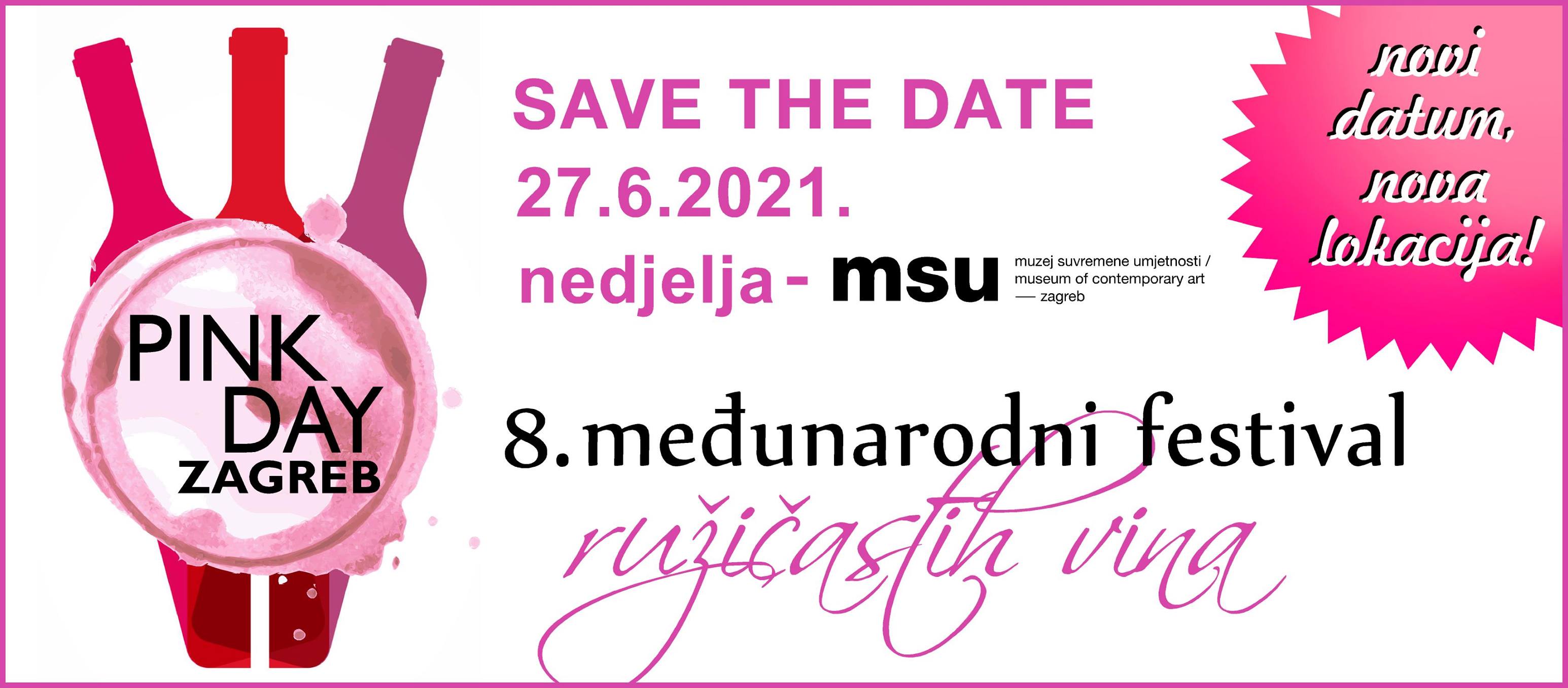
From Pink Day Official Facebook Page
At the press conference, WOW President and Pink Day founder Sanja Muzaferija, accompanied by art director Vlasta Pirnat, hostess Ana Lisak and MSU representatives, and in the presence of the co-organizer, IMC presented the novelties of the 8th Pink Day. Although the Festival always offers three or more wine and olive oil workshops, now for the first time, in cooperation with the Miva Wine Gallery, a Masterclass - World of Pink Champagnes by Moët Hennessy Group powered by Premium Visa has been organized, which has aroused great interest and sold out. just a few days. Visitors can expect two more workshops: Pink Austria, powered by Austrian Wine and with the help of the Office of the Federal Ministry of Agriculture, Regions, and Tourism at the Embassy of the Republic of Austria dedicated to Austrian rosés, and a workshop of extra virgin olive oils, Istria: Queen of Olive Oil powered by Catering Lisak, led by the famous Istrian expert Edi Družetić, who last year celebrated 40 years of work in olive growing.
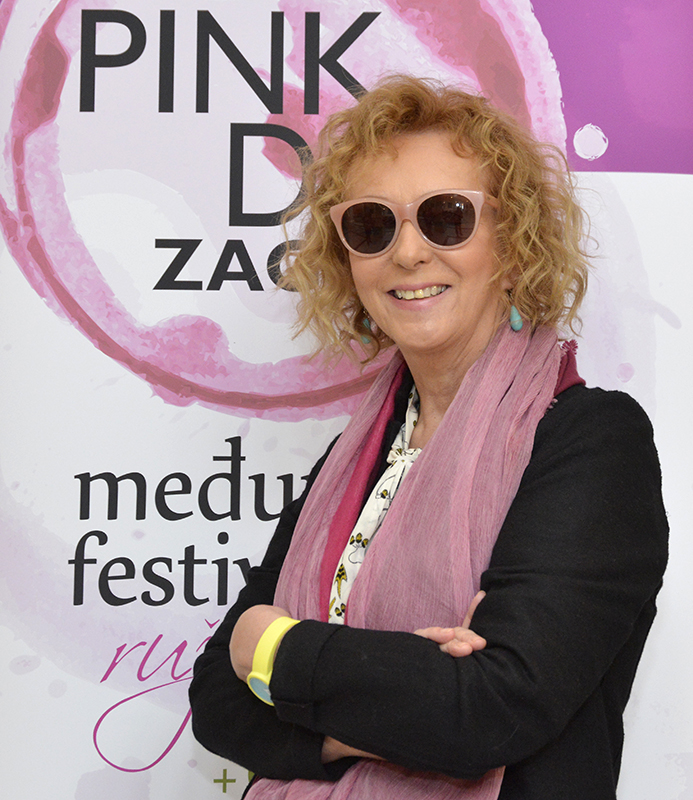
Sanja Muzaferija, Pink Day founder
‘‘I am extremely proud that this year our partner country is Austria and that, despite still somewhat problematic conditions, five exhibitors are coming from Austria, all under the auspices of Austrian Wine, but I am most looking forward to the exhibition venues of this year's Pink Day filled three weeks before the Festival. It is also important to me that we try, and I believe we succeed, to combine everything: to entertain, teach, cheer and celebrate rosé wines in a rosy mood. And let’s not forget the health and extra virgin olive oils. I thank the media that follow us faithfully and everyone who experiences Pink Day the way I imagined it: as a festival of optimism and enjoyment’’, said Muzaferija.
The ticket price for Pink Day is 150 kuna, while for members of the WOW association it is 50 kuna, and you can buy it at the entrance of the festival.
This year, Pink Day emphasizes the sale of wine, since last year was also extremely difficult for winemakers, and each winemaker will receive ten pink bags as a gift from the festival to sell their wine. Also, Pink Day continues to reward the most imaginative and creatively decorated exhibition table. Last year's prize, pink Jimmy Choo shoes, was won by the Italian winery Bottega, and this time as many as 4 prizes will be awarded. It will again be pink Jimmy Choo shoes: this time a Smokey model worth a thousand dollars, a work of art "DESIDERIO N° 1 ART MUST BE TASTED" by Austrian artist Andrew Stix, made especially for Pink Day, as well as Privee cosmetics Nikel, Croatian innovator Mirjana Brlečić, but also the ingenious bottle cap Coravin, worth 300 euros.
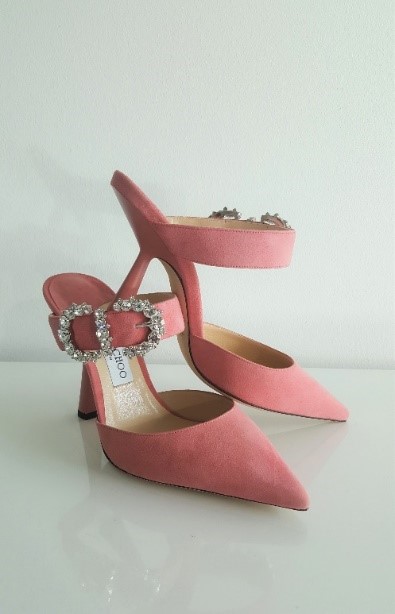
Pink Jimmy Choo shoes, last year's festival prize
Additionally, the current offer of all Croatian rosés will be judged by an independent jury composed of the most experienced Croatian wine judges. It is a mini-project "Drink Pink" conceived as part of the iVino concept, whose founders are journalists Ana Rogač and Ivo Kozarčanin. The best rosé wines of their choice and judgment decided, logically, to present and announce the winners, right on Pink Day.
As part of the press conference, Kutjevo held a presentation of the limited label Premium rosé, designed by the art director of Pink Day, Vlasta Pirnat, and the famous winemaker from Plešivica, Krešimir Ivančić, presented his Provencal-style rosé, Griffin Ambassador rosé. and Istrian olive oils were also tasted.
All of the above and much more interesting content await you at the 8th Pink Day, June 27, 2021, at the Zagreb Museum of Contemporary Art, MSU. All visitors will receive pink glasses as a gift until stocks run out so that after a long pandemic period they can try to look at the world more brightly and optimistically.
To learn more about the 8th Pink Festival, be sure to follow their Facebook and Instagram official accounts to find more information.
Croatian wines and grapes are among the best in the world, and you can find more information about them in Total Croatia’s Guide to Croatian Wine HERE.
For more on lifestyle in Croatia, follow TCN's dedicated page.
Plešivica Sparkling Wines Served With Breakfast at Special Event
June 6, 2021 - Guests enjoyed a pleasant encounter with the best selection of Plešivica sparkling wines and breakfast snacks, in the hills outside Zagreb.
A sparkling breakfast in the Chez Suzy vineyard for the weekend was the real formula for outdoor hedonism, reports Turističke Priče. At Plešivica, Šember wineries, Šoškić court wines, Drago Damir Režek, and a guest from the Krašić vineyards, Šimanović winery, presented their sparkling wines for which this wine region is famous. In addition to Plešivica sparkling wines, guests enjoyed strawberries and indigenous products of Zagreb County and copanjek, and homemade game salami. As an announcement of the upcoming Sparkling Zagorje breakfast in Zagorje, štruklji, zlevanka, cheeses, chocolate mousses, and chocolate cake were also served.
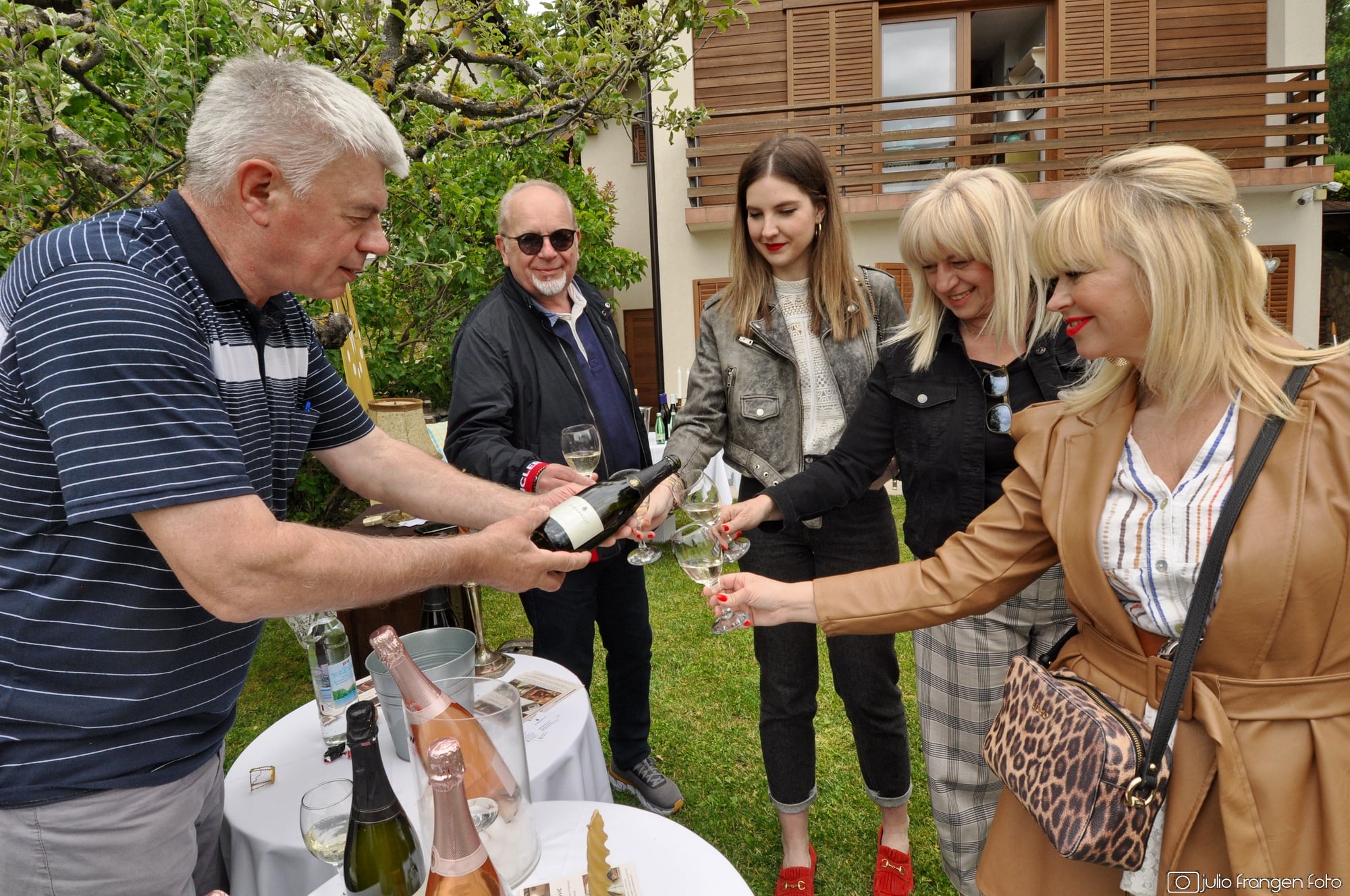
Salon of Sparkling Wines
The novelty of this year's Sparkling Breakfast edition was the guided pairing of food and Plešivica sparkling wines. The event was driven by the idea of the hostess Suzana Košćak, gastronomy students Izabela Andrašić, Adrian Karačić, Filip Poštenik, Bruno, Karić cooked at the event. The menus were paired with champagnes, after a hearty breakfast dominated by cheeses and strawberries, continued with freshly baked homemade focaccia and steak tartare that future chefs prepared next to the guests. It was a real "cooking show", and then from a small three delicious risottos came out in hot kitchens full of original ideas, the first with apple and celery, the second with asparagus, the third with strawberries. An additional joy of pairing was homemade macarons with champagne. Demanding but purposefully selected, the yellow lemon cream cookies were paired with white brut champagnes, and the pink champagnes matched the pink strawberry sour cream cookies. Macarons were made by a gastronomy student, Ana Tokić.
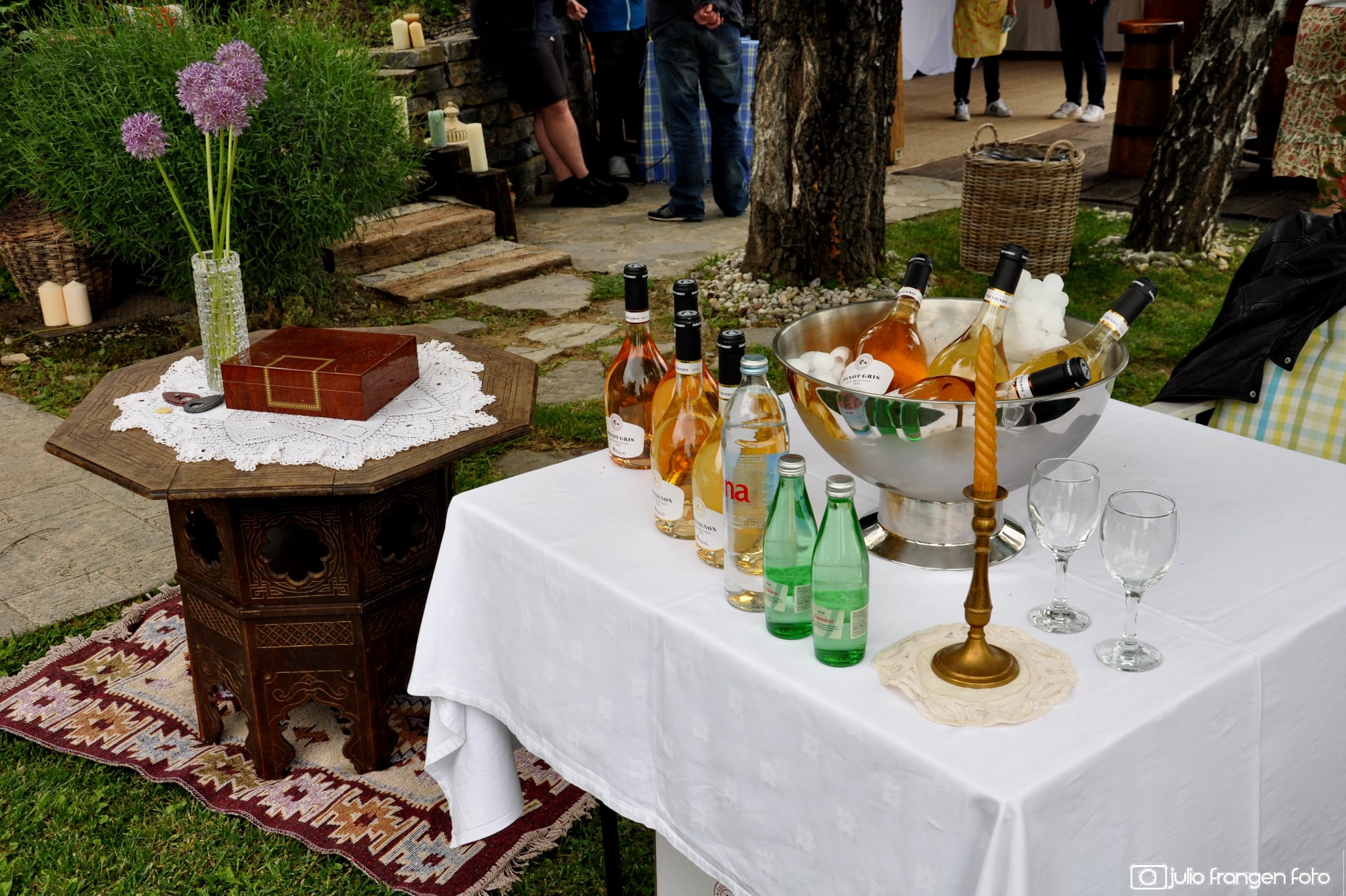
Salon of Sparkling Wines
The eye pleased, the palate celebrated, and the wines matched. The snacks were mesmerizing and the guests truly enjoyed themselves. An additional interesting and refined gathering was the presentation of a new wine from each winery, the so-called "An example of Plešivica". In this part of the program, Šember winery presented its new Chardonnay 2020, Šoškić wines, Sauvignon blanc 2020, Drago Damir Režek wines - Pinot Noir 2017, Šimanović wines presented Frankovka 2017. A special surprise of the day was Šoškić brandy, many did not know that such a pearl exists on Plešivica, it was sipped with gusto, gentlemen "spiced" it with cigars, and ladies with cigarillos. As an additional spice to the wonderful country atmosphere, similar to Provencal, served antique props from the Comedy Theater as well as tables and accessories from DVD Plešivica.
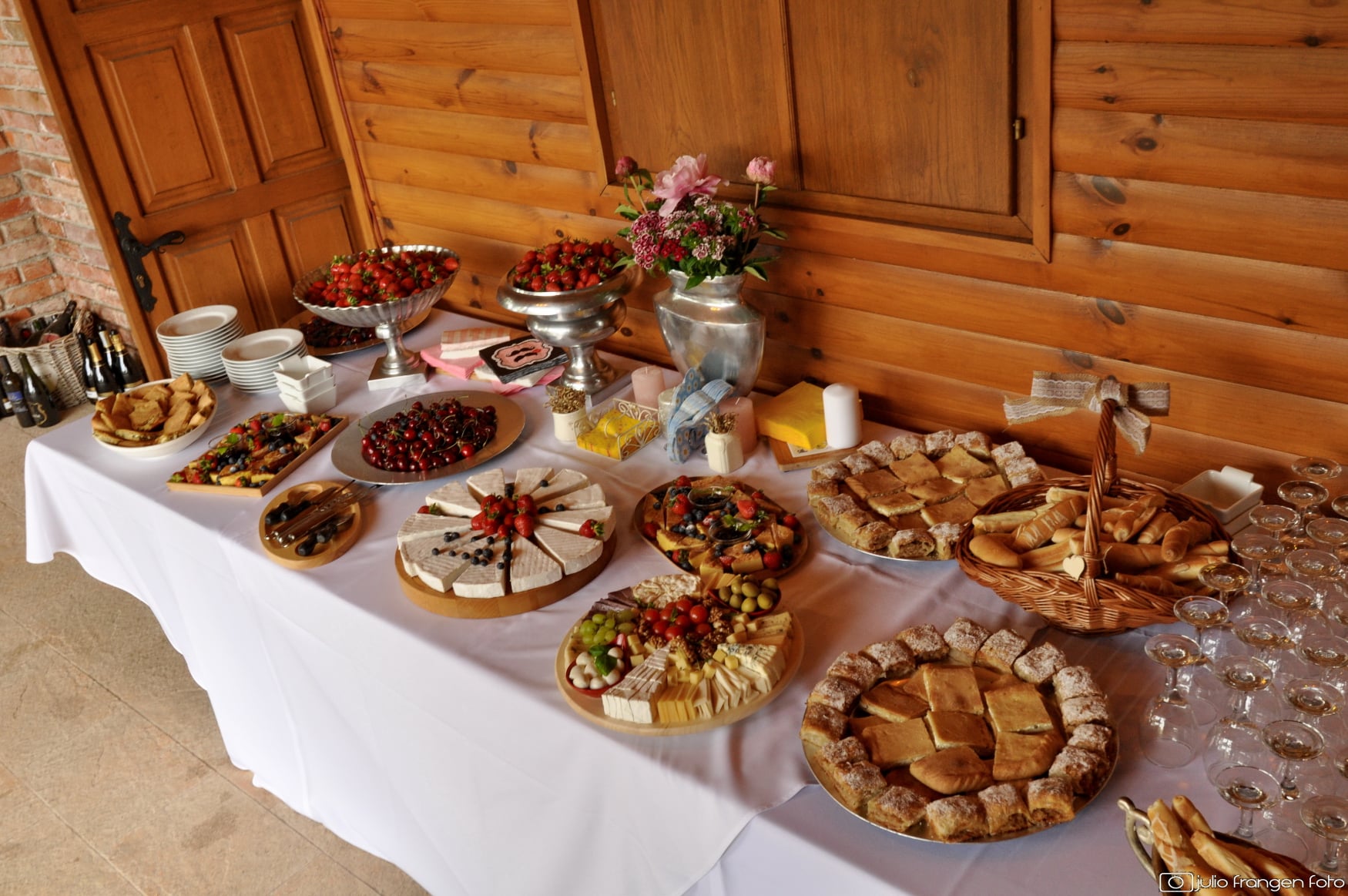
Salon of Sparkling Wines
Delighted guests, sparkling wine lovers, but also wine connoisseurs, sommelier, oenologists, wine merchants, in pleasant conversations with winemakers learned about Plešivica wines and selected snacks and the potential of various forms of tourist offer Plešivica in the context of branding wine destinations and entire vineyards through targeted, smaller events.
Croatian wines and grapes are among the best in the world, and you can find more information about them in Total Croatia’s Guide to Croatian Wine HERE. Total Croatia’s articles are now available in your language!
For all you need to know about Zagreb in 2021, make sure to bookmark Zagreb in a Page.
For more on lifestyle in Croatia, follow TCN's dedicated page.
Istrian Kabola Winery Sees Inheritance Turn into 130 Years of Tradition
May the 28th, 2021 - Croatia is very well known on the wine map for the fantastic products it sends out into the world, and the Istrian Kabola winery has seen inheritance turn into 130 years of tradition.
As Poslovni Dnevnik/Marta Duic writes,reliability, tradition and consumer confidence are the key to the success of any wine heritage story, and those points are all more than well known and applied by the popular Istrian Kabola winery, which is set to celebrate its 130th anniversary at the end of this month.
As many as three generations of the Markezic family have been making wine there, and they have been writing their own very long wine story since way back in 1891, when ''nono Ivan'' filled up the very first bottles of Muscat of Momjan, a variety that still intrigues those familiar with the wine world today.
Respecting tradition and nature, the current owner of the Istrian Kabola winery, Marino Markezic, with his innovative approach to winemaking, has positioned the family winery at the very top of the Croatian wine scene, which is no easy task. He was the one to open the Istrian Kabola winery officially in Kanedol near Momjan back on May the 29th, 2005, and this date is symbolically celebrated as a birthday.
The very first Istrian winery in terms of eco production
The Istrian Kabola winery is the very first Istrian winery that maintains its vineyards according to the stringent principles of eco production. With twenty hectares of vineyards to think about and take proper care of, Kabola produces about 100,000 bottles of wine a year, as well as another much loved Croatian product - olive oil, which also carries a bio-certificate. Although Croatia is their most important market, their exports to various countries have been growing more and more over recent years.
They mainly export to EU and non-EU European countries - Austria, Slovenia, Germany, Italy, France, Belgium, the Netherlands, Great Britain, Serbia, Bosnia and Herzegovina and Montenegro, and some of their wine travels over the Atlantic and finds its place on dinner tables in the United States. These are typically the Kabola-made wines that are chosen by more demanding consumers, both in retail and restaurants, hotels, and 25 percent of the quantities produced are exported.
Prolonged macerations such as those aged in amphorae or wooden barrels are especially sought after. The Istrian Kabola winery isn't only a synonym for top quality wines, as guests from all over the world, as well as various celebrities, come to this Istrian estate in person.
It was on this very estate that a 2Cellos video and scenes for The Hitman’s Wife Bodyguard, among other things, were filmed.
"We're really looking forward to the summer tourist season and we hope that it will be better than last year when, due to very well known circumstances, we had a drop in visits when compared to 2019. Although results like those from two years ago aren't expected yet, our regular guests who spend their summers in Istria never miss out on a visit to our estate for wine tasting and they've already announced their arrival. Since the opening of the Istrian Kabola winery this spring, we've been mostly visited by local guests, but with the easing the anti-epidemic measures, we expect guests from our traditional foreign markets,'' said Marino Markezic, Kabola's owner.
''We're constantly investing''
It's worth noting that the Istrian Kabola winery is mostly visited by guests from Slovenia, Italy, Austria, Germany, France, and a large number of guests come from the Asian market.
“Despite the great challenges for winemakers, the last wine year was great and provided wines of excellent quality. However, the challenges of the coronavirus pandemic were too great, we had to adapt quickly to the new situation and immediately switched to online sales and increased our social media presence and marketing to ensure our customers could easily reach our wines in spite of the lockdowns.
We're constantly investing in equipping the winery and cellar in order to achieve the best possible quality of wine and olive oil in our production process,'' concluded Markezic.
For more, follow Made in Croatia. For all you need to know about Croatian wine, bookmark our dedicated section.
Pelješac Cellar Festival Starts Tomorrow on the Famous Dalmatian Peninsula
May 14, 2021 - Starting tomorrow, the Pelješac Cellar Festival will take place in one of the most famous wine regions, and it will include discounts, workshops, and more!
Pelješac is well known for its wines, derived from the iconic Plavac Mali grape, which is responsible for the powerful reds made in the region. For some Croatian wine experts, the Plavac from the slopes of Dingač and Postup are among the best wines in the country.
The fame of the peninsula among wine lovers is indisputable, and to their delight, starting tomorrow a new edition of the Wine Festival will take place in Pelješac, the Pelješac Cellar Festival, and will last for a month.
As hrturizam.hr reports, wineries, shipowners, shellfish farms, family farms, restaurants, and taverns… 53 of them from all over the peninsula joined the largest event on Pelješac so far, the Pelješac Cellar Festival, which starts from Saturday, May 15 until June 15, 2021.
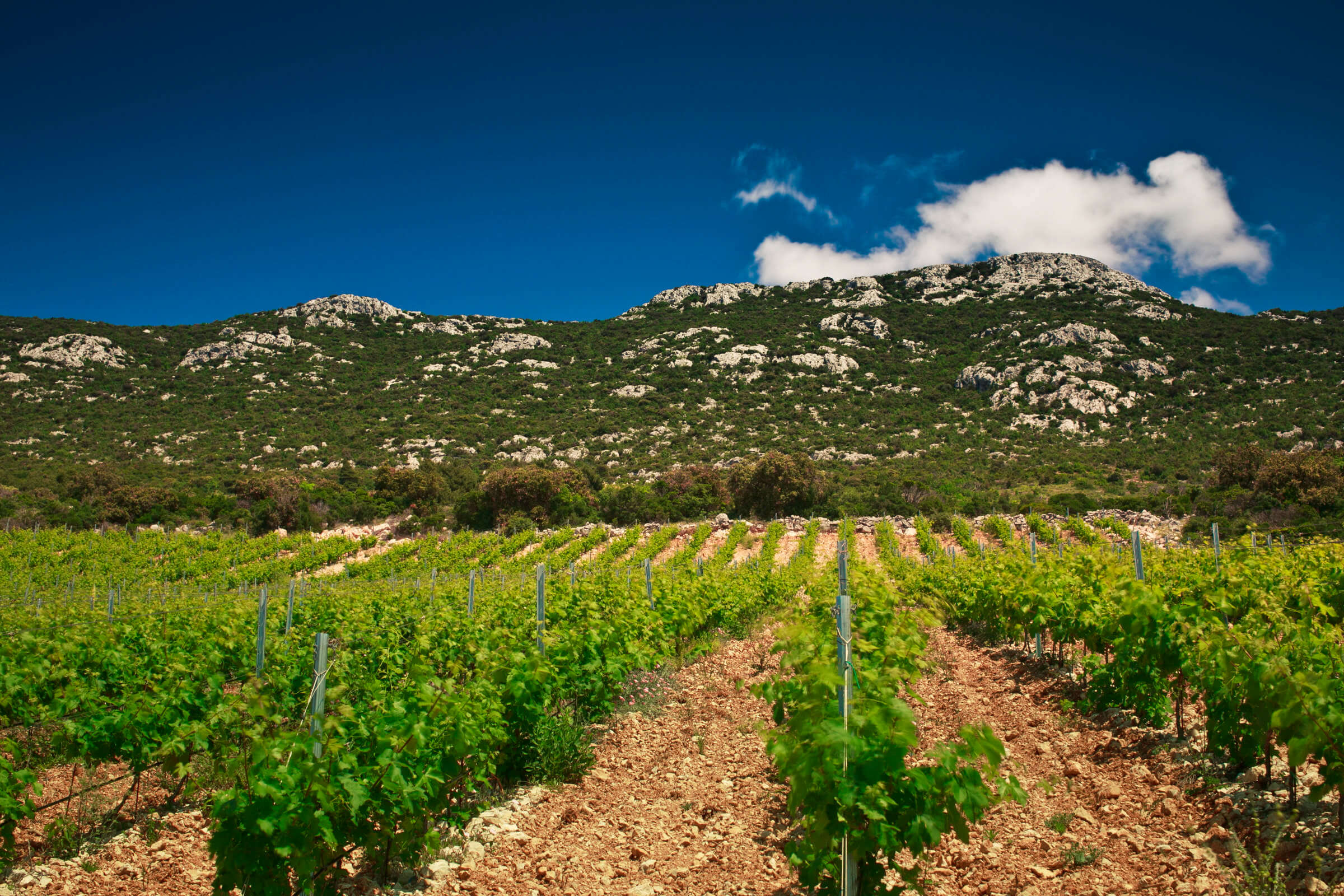
During the festival, the wineries participating in the project will offer their visitors discounts on wine (20% on certain wine palettes), and restaurants and taverns will have menus with traditional Peljesac specialties with a glass of local wine designed specifically for the festival (two menus, one of 120 kuna and one of 180 kuna). The festival will also include educational workshops, professional lectures, and various other events of interest to wine lovers.
‘‘We are glad that a large number of winemakers have joined the Pelješac Cellar Festival, which focuses on Plavac Mali, a trademark of our peninsula and one of the largest wine brands in Croatia. All research confirms that the eno-gastronomic offer is among the first three motives for tourists to come to our country, and our wine empire with famous vineyards such as Ponikava, Dingač, and Postup, has become a real tourist attraction and not only for wine lovers. As part of the Festival on June 4th and 5th, we are organizing the traditional Pelješac Cellars Open Days, an event that usually takes place in December. We hope that this June version will become another traditional wine festival’’, said Slobodan Rosić, secretary of the associations Pelješac Wine Routes and Plavac Mali Pelješac.
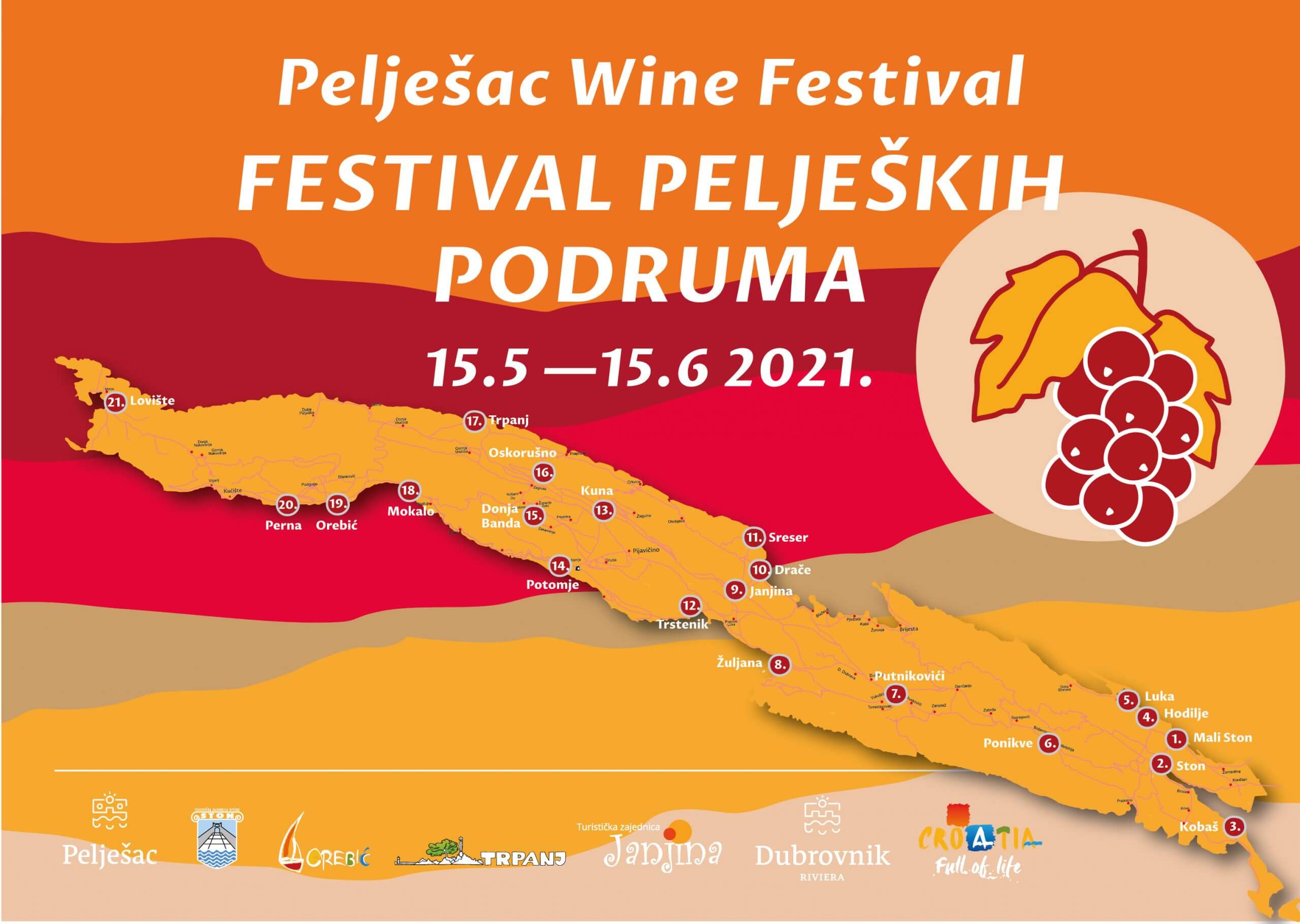
The director of the Ston Tourist Board, Fani Slade, pointed out that all four tourist boards from Pelješac are participating in this project in addition to Ston: the Tourist Boards of Janjina, Orebić, and Trpanj, and the idea was realized in cooperation with Feel IQM. He says that the Festival would not have been possible without the support of the associations Ston's Shellfish, Pelješac Wine Routes, and Plavac mali Pelješac, as well as the Ston Walls, Solana Ston, and the Maritime Museum in Orebić.
‘‘We have taken care of epidemiological measures, so there is no mass gathering during the event, and we plan to hold an accompanying program such as wine workshops and conferences online. We also recommend all visitors announce their arrival at the winery, family farm, restaurant, or tavern in advance. We believe that next year the pandemic will be behind us, so the second edition of the Pelješac Cellars Festival will offer a rich entertainment and educational program’’, says Slade.
Croatian wines and grapes are among the best in the world, and you can find more information about them in Total Croatia’s Guide to Croatian Wine HERE. You can also learn more about what the Pelješac peninsula can offer you on your next trip, in Total Croatia’s Pelješac peninsula on a page, HERE. Total Croatia’s articles are now available in your language!
For more on travel in Croatia, follow TCN's dedicated page.


